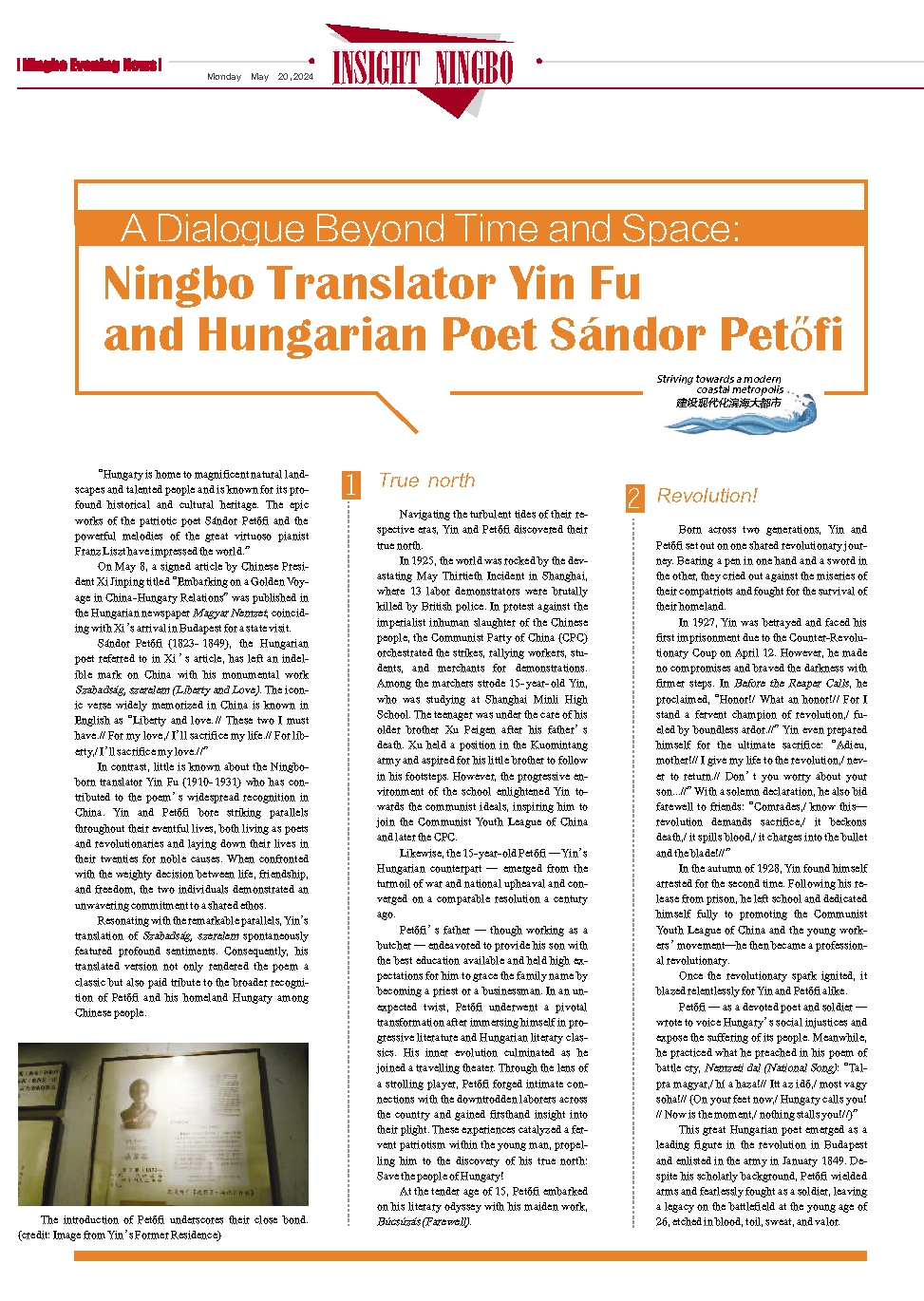“Hungary is home to magnificent natural landscapes and talented people and is known for its profound historical and cultural heritage. The epic works of the patriotic poet Sándor Petőfi and the powerful melodies of the great virtuoso pianist Franz Liszt have impressed the world.”
On May 8, a signed article by Chinese President Xi Jinping titled “Embarking on a Golden Voyage in China-Hungary Relations” was published in the Hungarian newspaper Magyar Nemzet, coinciding with Xi’s arrival in Budapest for a state visit.
Sándor Petőfi (1823-1849), the Hungarian poet referred to in Xi’s article, has left an indelible mark on China with his monumental work Szabadság, szerelem (Liberty and Love). The iconic verse widely memorized in China is known in English as “Liberty and love. // These two I must have.// For my love,/ I’ll sacrifice my life.// For liberty,/ I’ll sacrifice my love.//”
In contrast, little is known about the Ningbo-born translator Yin Fu (1910-1931) who has contributed to the poem’s widespread recognition in China. Yin and Petőfi bore striking parallels throughout their eventful lives, both living as poets and revolutionaries and laying down their lives in their twenties for noble causes. When confronted with the weighty decision between life, friendship, and freedom, the two individuals demonstrated an unwavering commitment to a shared ethos.
Resonating with the remarkable parallels, Yin’s translation of Szabadság, szerelem spontaneously featured profound sentiments. Consequently, his translated version not only rendered the poem a classic but also paid tribute to the broader recognition of Petőfi and his homeland Hungary among Chinese people.
True north
Navigating the turbulent tides of their respective eras, Yin and Petőfi discovered their true north.
In 1925, the world was rocked by the devastating May Thirtieth Incident in Shanghai, where 13 labor demonstrators were brutally killed by British police. In protest against the imperialist inhuman slaughter of the Chinese people, the Communist Party of China (CPC) orchestrated the strikes, rallying workers, students, and merchants for demonstrations. Among the marchers strode 15-year-old Yin, who was studying at Shanghai Minli High School. The teenager was under the care of his older brother Xu Peigen after his father’s death. Xu held a position in the Kuomintang army and aspired for his little brother to follow in his footsteps. However, the progressive environment of the school enlightened Yin towards the communist ideals, inspiring him to join the Communist Youth League of China and later the CPC.
Likewise, the 15-year-old Petőfi — Yin’s Hungarian counterpart — emerged from the turmoil of war and national upheaval and converged on a comparable resolution a century ago.
Petőfi’s father — though working as a butcher — endeavored to provide his son with the best education available and held high expectations for him to grace the family name by becoming a priest or a businessman. In an unexpected twist, Petőfi underwent a pivotal transformation after immersing himself in progressive literature and Hungarian literary classics. His inner evolution culminated as he joined a travelling theater. Through the lens of a strolling player, Petőfi forged intimate connections with the downtrodden laborers across the country and gained firsthand insight into their plight. These experiences catalyzed a fervent patriotism within the young man, propelling him to the discovery of his true north: Save the people of Hungary!
At the tender age of 15, Petőfi embarked on his literary odyssey with his maiden work, Búcsúzás (Farewell).
Born across two generations, Yin and Petőfi set out on one shared revolutionary journey. Bearing a pen in one hand and a sword in the other, they cried out against the miseries of their compatriots and fought for the survival of their homeland.
In 1927, Yin was betrayed and faced his first imprisonment due to the Counter-Revolutionary Coup on April 12. However, he made no compromises and braved the darkness with firmer steps. In Before the Reaper Calls, he proclaimed, “Honor!/ What an honor!// For I stand a fervent champion of revolution,/ fueled by boundless ardor.//” Yin even prepared himself for the ultimate sacrifice: “Adieu, mother!// I give my life to the revolution,/ never to return.// Don’t you worry about your son...//” With a solemn declaration, he also bid farewell to friends: “Comrades,/ know this—revolution demands sacrifice,/ it beckons death,/ it spills blood,/ it charges into the bullet and the blade!//”
In the autumn of 1928, Yin found himself arrested for the second time. Following his release from prison, he left school and dedicated himself fully to promoting the Communist Youth League of China and the young workers’ movement—he then became a professional revolutionary.
Once the revolutionary spark ignited, it blazed relentlessly for Yin and Petőfi alike.
Petőfi — as a devoted poet and soldier — wrote to voice Hungary’s social injustices and expose the suffering of its people. Meanwhile, he practiced what he preached in his poem of battle cry, Nemzeti dal (National Song): “Talpra magyar,/ hí a haza!// Itt az idő,/ most vagy soha!// (On your feet now,/ Hungary calls you!// Now is the moment,/ nothing stalls you!//)”
This great Hungarian poet emerged as a leading figure in the revolution in Budapest and enlisted in the army in January 1849. Despite his scholarly background, Petőfi wielded arms and fearlessly fought as a soldier, leaving a legacy on the battlefield at the young age of 26, etched in blood, toil, sweat, and valor.
Revolution!



